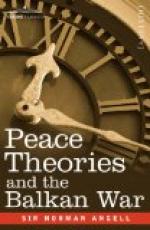It is a like confusion of thought which prompts Mr. Churchill to refer to Pacifists as people who deem the danger of war an illusion.
This persistent misconception is worth a little examination.
* * * * *
The smoke from the first railway engines in England killed the cattle and the poultry of the country gentlemen near whose property the railroad passed—at least, that is what the country gentleman wrote to the Times.
Now if in the domain of quite simple material things the dislike of having fixed habits of thought disturbed, leads gentlemen to resent innovations in that way, it is not astonishing that innovations of a more intangible and elusive kind should be subject to a like unconscious misrepresentation, especially by newspapers and public men pushed by commercial or political necessity to say the popular thing rather than the true thing: that contained in the speech of Mr. Churchill, which, together with a newspaper comment thereon, I have made the “text” of this little book, is a typical case in point.
It is possible, of course, that Mr. Churchill in talking about “persons who profess to know that the danger of war has become an illusion,” had not the slightest intention of referring to those who share the views embodied in “The Great Illusion,” which are, not that the danger of war is an illusion, but that the benefit is. All that happened was that his hearers and readers interpreted his words as referring thereto; and that, of course, he could not possibly prevent.
In any case, to misrepresent an author (and I mean always, of course, quite sincere and unconscious misrepresentations, like that which led the country gentlemen to write that railway smoke killed poultry) is a trifling matter, but to misrepresent an idea, is not, for it makes that better understanding of facts, the creation of a more informed public opinion, by which alone we can avoid a possibly colossal folly, an understanding difficult enough as it is, still more difficult.
And that is why the current misrepresentation (again unconscious) of most efforts at the better understanding of the facts of international relationship needs very badly to be corrected. I will therefore be very definite.
The implication that Pacifists of any kind have ever urged that war is impossible is due either to that confusion of thought just touched upon, or is merely a silly gibe of those who deride arguments to which they have not listened, and consequently do not understand, or which they desire to misrepresent; and such misrepresentation is, when not unconscious, always stupid and unfair.




